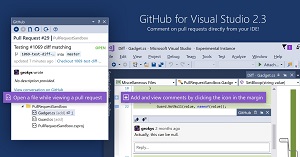News
GitHub for Visual Studio Adds Pull Request Comments from IDE
GitHub for Visual Studio 2.3 is out, featuring a new ability to comment on pull requests.
The GitHub for Visual Studio 2.3 extension from GitHub Inc. lets Visual Studio developers connect to repositories stored in the popular software development platform, home of most open source projects.
It provides functionality such as: one-click cloning of repositories; creating GitHub repositories; creating Gists (code snippets); publishing code to GitHub; creating and viewing pull requests from within the IDE; and more.
In the new release, that last bit of functionality concerning pull requests has been improved.
 [Click on image for larger view.] Illustrating the New Functionality (source: GitHub).
[Click on image for larger view.] Illustrating the New Functionality (source: GitHub).
"GitHub for Visual Studio 2.3 adds the ability to comment on pull requests directly from your IDE," GitHub said in a blog post. "Simply open a pull request in the GitHub pane in Visual Studio, and open a compare view, and you'll see existing comments right there in the editor. Click the icon in the margin to add new comments."
According to the release notes, another addition provides the ability to select fork/parent pull requests. The first release featuring the new capabilities is limited in scope, but GitHub promises more to come.
"The functionality is limited right now to adding single comments, but we're hoping to bring the whole GitHub review experience right into Visual Studio soon!" the company said.
Most other changes in the new release have to do with bug fixes, with some minor feature improvements.
About the Author
David Ramel is an editor and writer at Converge 360.